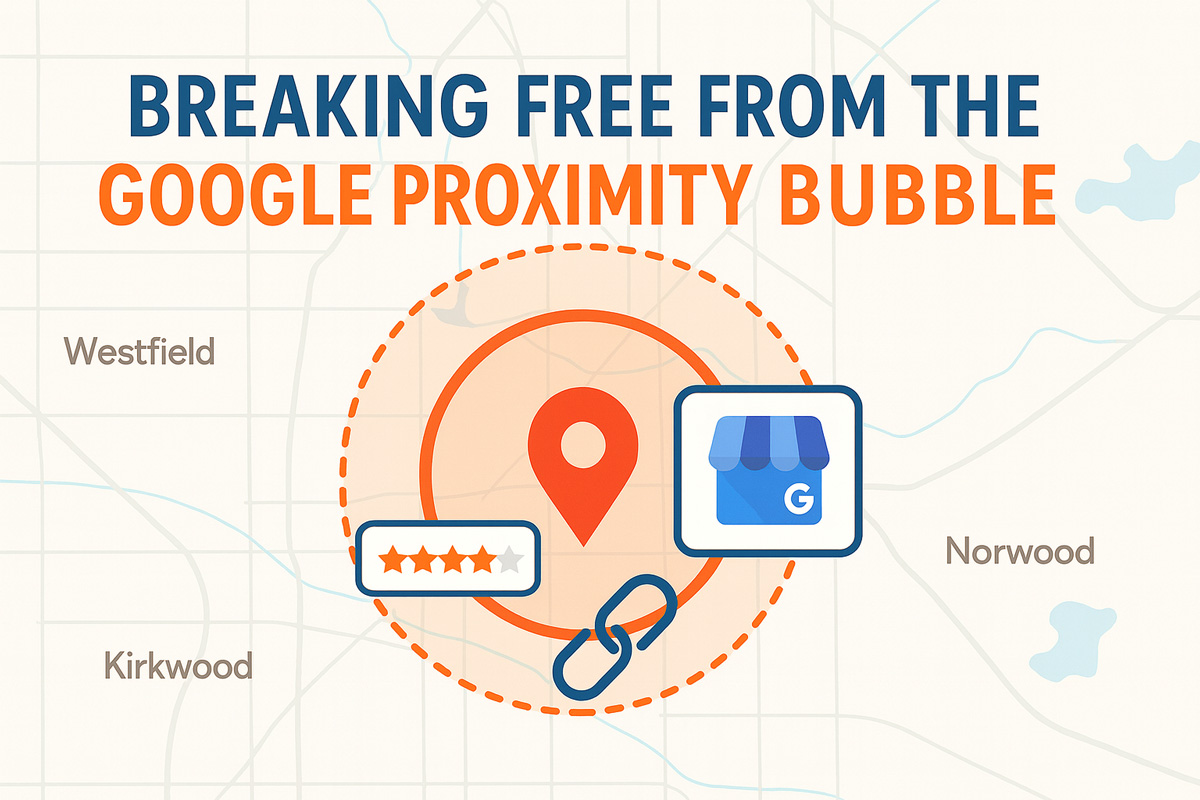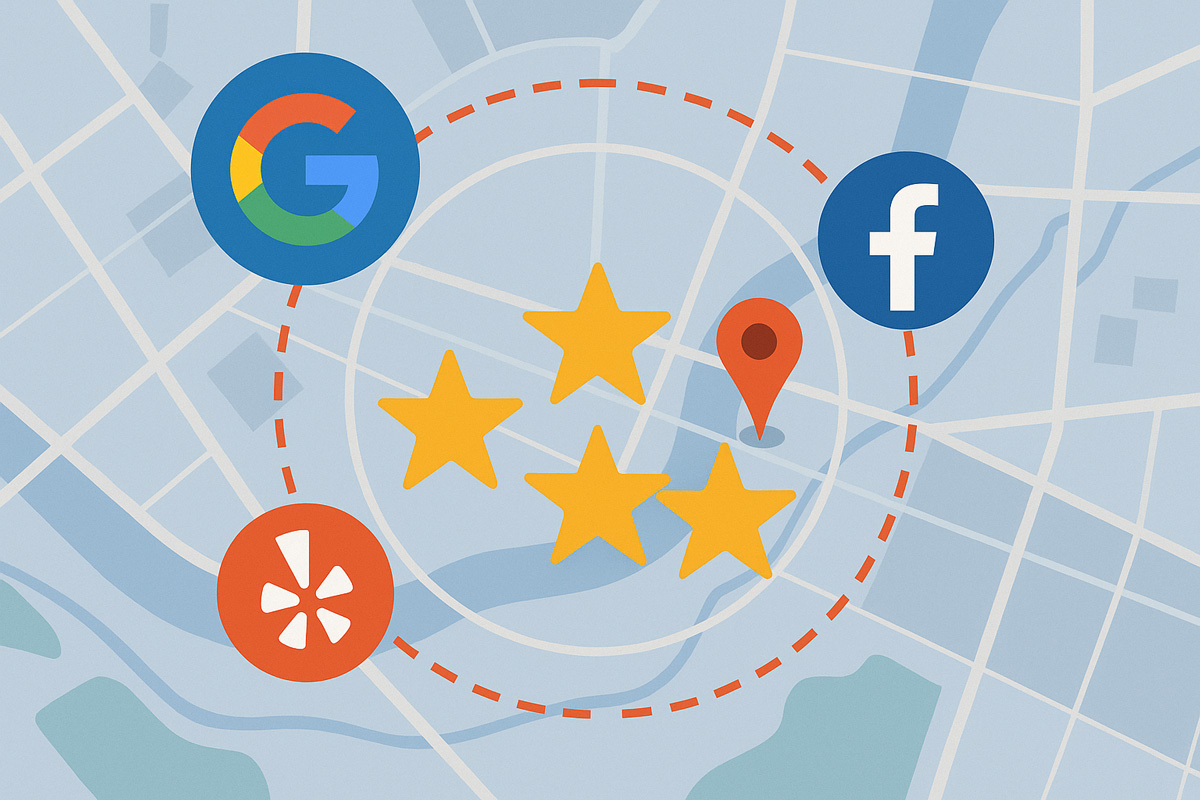How to Overcome Google’s Proximity Bias and Expand Your Search Visibility
If you’ve searched for a business on Google, you’ve likely noticed that the top results within Google’s local pack are often located very close to your current location. That’s no coincidence — it’s what we call Google’s proximity bias. In short, Google heavily factors a searcher’s physical location and distance from relevant, nearby businesses into its search results.
While this arguably makes sense for someone looking for the nearest coffee shop, it can be frustrating for small businesses whose ideal customers may be several miles—or even cities—away from their storefront.

If you want a deeper dive, check out my full breakdown of the Google proximity bias factor. But here’s the gist: Proximity bias means Google is more likely to show businesses physically closer to the searcher, even if other businesses farther away might offer better products, services, or reviews.
So, how do you overcome Google’s proximity bias and make sure you’re visible to potential customers beyond your immediate area? That’s what we delve into within this article.
Table of Contents
1. Boost Your Review Collection Strategy
You Google review collection strategy can have a tremendous impact on the proximity bias.
Comparative Review Count Matters
If your business has significantly more reviews—and higher ratings—than competitors, you can often push your visibility radius outward. For example, a plumber with 250 glowing reviews that’s 5 miles away may outrank a competitor just two miles from the searcher who only has 9 reviews. Learn more about comparative review count and review thresholds in my article on Google review SEO factors.
Diversify Where You Collect Reviews
Don’t put all your review eggs in Google’s basket. Customers use many platforms to search for and review businesses.

Additionally, both Google, and other AI powered search engines and LLMs, examine your review presence on other platforms to rank you within their own system. Check out how Review Diversity is becoming more critical each day.
2. Build Authority in Your Industry and Location
Google rewards companies it considers authoritative and trustworthy. This has very little do with having a good website. Instead, it’s about creating helpful content, earning mentions from other reputable sources, and being consistently active within your target community.

Local Link Building and Media Mentions Is Key
Partner with nearby organizations, sponsor events, or contribute to local news outlets and industry-relevant publications. For example, an HVAC company in one city could sponsor a charity 5K in a neighboring town to earn a valuable link from that town’s Chamber of Commerce site—signaling relevance in that location.
3. Optimize Everywhere Your Business Appears
Proximity bias affects Google local packs (the little map with the top 3-4 businesses within a Google Search) the most. However, you can still win customers outside your radius through organic results and Google’s local finder, which show more businesses than the local pack and have less emphasis on proximity.
As a result, you must ensure your online presence is complete and polished across all surfaces. Here are a few tasks to get started:
- Keep your business listings accurate, fully completed, and up-to-date on every platform.
- Fully optimize your Google Business Profile (GBP) — business info, attributes, photos/videos, hours, services, products, Q&A, review collection, and more.
- Claim and optimize all local listings across major directories. Tools like SEMrush’s Listing Management Platform can help you manage this from one dashboard and sync to dozens of listings at once.
4. Don’t Ignore the Competition’s Rule-Breaking
Sometimes competitors try to game the system—using fake addresses, keyword stuffing business names, or other tactics that violate Google’s policies. Did you know that you can report businesses who are violating Google’s terms of use and content policies? Google may remove or suspend competitors’ business listings on Google if they are alerted to the policy-violating actions. It's much easier to reach customers further away if fewer businesses are between you and your desired competition!

If you want to keep an eye on how you’re doing compared to your competitors, consider setting up a rank tracking system. This can help you figure out which companies you should investigate for potential policy violations.
5. Pay Attention to AI Features in Search
Google’s AI Overviews and other AI/LLM-powered features use slightly different algorithms from the traditional local pack. These can offer more flexibility in surfacing results beyond strict proximity rules. The aforementioned review diversification and authority building play a big role in showing up in these new formats.
6. Consider Opening a Second Location
If proximity bias is severely limiting your reach, a second location can dramatically expand your footprint. Instead of just having one circle on a map that you are trying to expand, imagine having two separate circles on the map. That’s effectively how it works in Google’s eyes when you open a second location.
If you’re considering this route, check out our guide on how to pick your next business location from a digital marketer’s perspective.
Fight Back Against Google’s Proximity Bias
Google’s proximity bias isn’t going away anytime soon. In fact, we’ve only seen the proximity bias’ impact increase in recent years as Google has updated its algorithms, including the Vicinity Update. However, it doesn’t have to limit your growth. By strategically building authority, optimizing your online presence, collecting diverse reviews, and even considering new locations, you can expand your visibility within search engines.
If you found these tips helpful, subscribe to our free newsletter for more practical SEO insights. And if you’d like tailored, hands-on help, the team at Igniting Business would be happy to discuss how we can boost your reach in search.
At no additional cost to you, we may receive a commission if you click on some of the links on this website and make a purchase.
About the author
Ben Seidel is the CEO and Founder of Igniting Business. Ben has been serving hundreds of small businesses with web design and SEO services for over 15 years and covering digital marketing related topics since 2012.
Over the years, Ben has been recognized on a local and national level, including entrepreneurship awards from both the NFIB and NASE and being featured in publications such as CNBC Universal, Yahoo News, Intuit Small Business, CIO.com, Mizzou Magazine, and Fox Business.